The Philippine Tobacco Institute (PTI) supports proposals in the House of Representatives to address rising illicit trade and declining tobacco tax collections, highlighting successful experiences from neighboring countries that suspended annual tobacco excise tax hikes.
“By pausing the annual excise tax increases, the prices of legitimate products such as cigarettes can stabilize and decrease the incentive for consumers to purchase illicit smuggled products,” PTI president Jericho “Koko” B. Nograles said during the Senate Ways and Means Committee hearing on January 9, which focused on the illicit tobacco trade.
Senate Ways and Means Committee Chairman Sherwin Gatchalian underscored the urgency of addressing the illicit tobacco trade, calling it a “lose-lose situation” for the country.
“The reason we impose excise tax on tobacco products is so we can have better health outcomes. But smoking prevalence has now reversed. We’re now in a lose-lose situation because smoking prevalence is going up, tax collection is going down,” Gatchalian said.
In response to declining collections and a growing black market, lawmakers introduced House Bill (HB) 11279 on Tuesday, which seeks a one-year suspension of the automatic 5% annual tax hike on cigarettes, heated tobacco products, vapor products, and cigars.
The bill is sponsored by a group of House leaders, including Deputy Speaker and Isabela 1st District Rep. Antonio “Tonypet” Albano, Deputy Speaker and Ilocos Sur 2nd District Rep. Kristine Singson Meehan, Ilocos Norte 2nd District Rep. Angelo Marcos Barba, Kabayan Party-list Rep. Ron Salo, Ifugao Lone District Rep. Solomon Chungalao, and PBA Party-list Rep. Margarita Nograles-Almario.
Data from the Food and Nutrition Research Institute (FNRI) show that tobacco excise tax collections have dropped from ₱176 billion in 2021 to ₱130 billion in 2024, even as adult smoking prevalence increased from 19% in 2021 to 24.4% in 2023.
Nograles pointed to Singapore as a model, noting that its moratorium on excise tax hikes successfully stabilized the market and improved government revenues. “Singapore implemented a similar moratorium for eight years and was successful in increasing excise tax collections,” he said.

A study in the World Customs Journal by economists Adrian Cooper and Daniel Witt noted that Singapore raised its cigarette excise duty from SGD150 to SGD352 per 1,000 sticks between 2000 and 2005, but revenues declined by 20% between 2003 and 2006 due to a surge in illicit trade.
In response, the Singaporean government froze tax increases and ramped up enforcement, which helped duty-paid cigarette volumes recover and brought down the illicit market share from 22% in 2006 to 15.9% by 2010.
According to Bureau of Internal Revenue (BIR) Head Revenue Executive Assistant Don Galera, the agency’s tobacco excise tax collection in 2023 totaled ₱134 billion, falling short of its ₱185 billion target.
Senator Gatchalian warned of the long-term impact if the government fails to address illicit trade. “If we don’t focus our attention on this, we’ll end up with a scenario where illicit trade might be bigger than legal activities,” he added.
Gatchalian highlighted the increasing volume of seized illicit tobacco despite enforcement efforts, emphasizing the need for a new approach. “In my opinion, enforcement is not enough. We have to look at the other causes of illicit trade in our country. We cannot ignore the theory of incentives given the significant price difference between illicit cigarettes and legitimate ones,” he said.
He added, “We must recognize the harm this causes—not just in lost revenue but also the health risks, as these activities operate under the radar.”



















